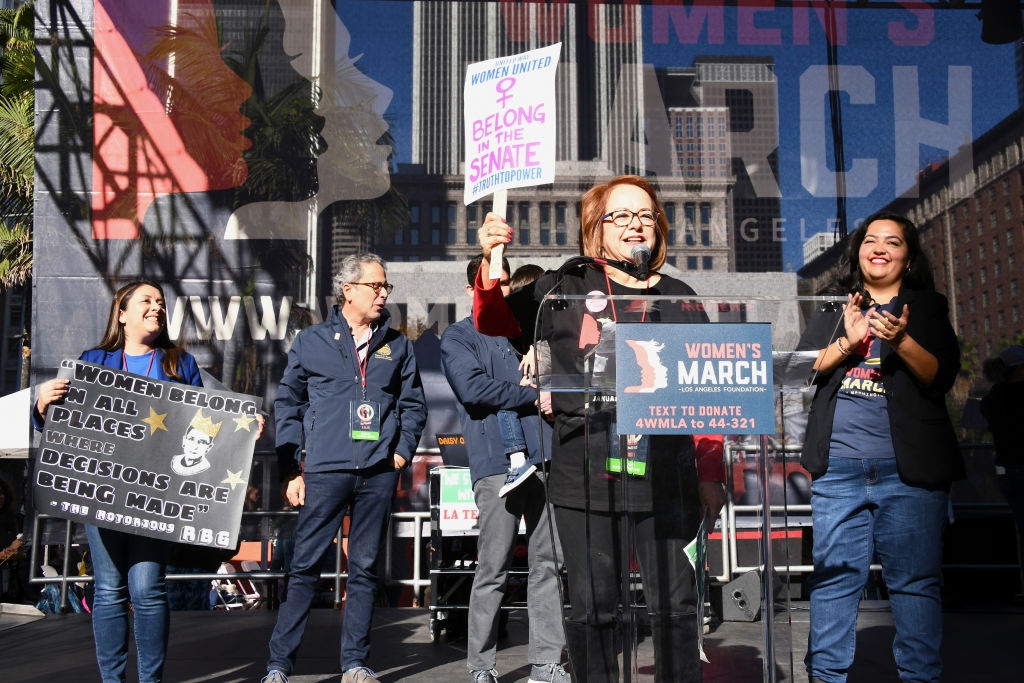Latest News
María Elena Durazo Talks Pandemic-Era Gains for Workers and the Undocumented
The state senator says ‘we’re starting to break through’ on expanding the safety net for all Californians.

The gap between the rich and the poor in California is continuing to grow, spurred by the COVID-19 pandemic. So what are the Golden State’s politicians doing to turn the tide?
Capital & Main talked to California state Sen. María Elena Durazo, who has represented the neighborhoods of Central and East Los Angeles contained in District 24 since 2018, about her efforts to build worker power, expand health care access and make sure immigrants are included in the safety net. Durazo is running for reelection to the state Senate this year.
Durazo joined the labor movement in the early 1980s as a member of the Hotel Employees and Restaurant Employees Union, known as UNITE HERE, where she fought to give Los Angeles’ immigrant workers a voice in local government. By 1989, she became president of Los Angeles’ hotel workers union Local 11.
For almost a decade, Durazo was the executive secretary-treasurer of the Los Angeles County Federation of Labor, a coalition of hundreds of unions and labor groups that champion the rights of low wage and immigrant workers. Durazo also served as chair of the American Federation of Labor and Congress of Industrial Organizations (AFL-CIO) Immigration Committee, among other roles with the national coalition of labor unions.
Note: This interview has been edited for length and clarity.
Capital & Main: The COVID-19 pandemic deepened and exposed inequality in the United States. How have you and other California lawmakers tried to address this?
California State Sen. María Elena Durazo: We didn’t resolve it, but we’re starting to break through on the safety net for workers and the undocumented.
Even though it’s temporary, we did get paid sick leave, for example. That impacts mostly low income workers, although all workers were able to get it. We’ve opened the door. I think we’ll be able to keep pushing for some version of it in the future, because people do realize that it was these essential workers — many of them low wage, undocumented, immigrant, Latino and people of color — who got hurt. So we have to keep talking about a more permanent solution, not just a temporary one.
For hospitality workers in the hotel industry, we won the right for them to get their jobs back as business began to normalize. UNITE HERE Local 11 had a case in which the Terranea hotel was found guilty of violating that law. So those workers are gonna get some money, they’re gonna get their jobs back. And all of that was because we fought for that kind of protection.
“We’re not going to be able to address all the issues of poverty unless, in the workplace, workers have the power to negotiate higher wages.”
California remains among the states with the highest levels of economic inequality, despite progressive laws and union organizing successes. What is your vision for reducing inequality and improving the lives of workers in California?
There’s a number of ways in which we’re looking to more permanent solutions, not just addressing the immediate crisis. One is to empower workers in various industries.
My bill on garment worker protections was created in connection with organizers on the ground from the Garment Worker Center, primarily women, who needed stronger tools to organize their co-workers. While the bill is connected to making employers more responsible for paying wages and dealing with wage theft, mostly it was about those workers having the tools to do it for themselves.
That’s where I think that we begin to see the empowerment of workers, and not just a law that is passed and put on a shelf. In this case, the California labor commissioner stepped in and has a much larger team under her that will work with the Garment Worker Center. Now you’re talking about an industrywide impact.
When it comes to tackling economic inequality, where do you see eye to eye with Gov. Gavin Newsom? Where do you hope to push him if he has a second term?
We’re not going to be able to address all the issues of poverty unless, in the workplace, workers have the power to negotiate higher wages. And that’s what’s missing right now in a number of industries.
The governor has done well in a number of areas, but he needs to do a better job and have a stronger commitment to getting more rights for farmworkers to organize. He vetoed a bill last year which would have allowed farmworkers the ability to vote for union by mail, just like we do for president or governor or anything else.
There’s a lot workers should be able to do on their own when they are empowered through collective bargaining.
For domestic workers, we took a big step forward. We didn’t get to where we should have, which is domestic workers being covered under Cal/OSHA. So we haven’t quite finished.
Much of the public sector work that was unorganized, like child care providers, SEIU was successful in getting them recognized this last year. Tens of thousands of child care workers are organized now. They’re getting the kind of rate increases that they should to make a living providing something that our communities and families need.
Then there’s legislation that’s being proposed for fast food workers to have wages set industrywide, rather than workplace by workplace.
“We’re trying to help about 40,000 immigrant students that don’t have the usual visas, and don’t fall in the category of DACA, so that they have access to in-state tuition.”
Every year for more than two decades, the California Chamber of Commerce has helped block many of the bills on its so-called job killer list. How are you and other legislators ensuring this doesn’t get in the way of your priorities?
The garment worker bill was a “job killer” for the Chamber, and we got that through. The governor signed it.
We just have to stay with it. And our arguments are not “Well, no, it’s not a job killer, blah, blah, blah.” There’s nothing that’s going to kill jobs, but I’m not going to use their talking points, I’m going to use our reality, the reality of workers.
You’ll see more bills can be passed in that way, and not because I’m in a fight with a Chamber.
A current bill that the Chamber called a job killer just after our first hearing on it is SB 1044. It’s meant to allow workers to keep themselves safe in case of disasters and emergencies. For example, if there’s a shooting at the school where your kids are, you’d be able to go attend to your kids. If there was an earthquake, if there was a fire, if you’re in a dangerous situation, if your life is on the line. These are all common sense, and anybody who would not support the common sense ability of a worker to leave or to have access to a communication device, I think they’ve really crossed over the line in trying to stop workers from protecting themselves and their families.
Many of the bills you back are intended to support California’s immigrants. With the president and U.S. Congress stalling on immigration reform, what is California doing to protect these residents?
We don’t have the ability to change the immigration laws so that they could get their path to citizenship. But we push the envelope on every other level that we can.
There are issues that we’ve taken up as far as the detention centers go. We won last year on one of my bills requiring detention centers to be insured with every kind of coverage that other employers and businesses have. This will require transparency.
We’re also continuing to break down any barriers to education one by one. Education is extraordinarily important for all of us, but it’s especially important for immigrant families. That’s why they take the risks that they do. The first step was in-state tuition, then access to financial aid for those in graduate studies. We’re trying to help about 40,000 immigrant students that don’t have the usual visas, and don’t fall in the category of Deferred Action for Childhood Arrivals (DACA), so that they have access to in-state tuition.
So there’s a number of fronts — education, workplace, health and safety — in which immigrants are at the core. And we’re going to continue to do that in the California state Legislature. We have great legislators who are hardcore about this, from Assemblymembers Eloise Gómez Reyes, Miguel Santiago and Wendy Carrillo to state Sen. Lena Gonzalez, and especially at the Latino Legislative Caucus.
California has become a national trailblazer in expanding government-funded health coverage to almost all residents regardless of immigration status. How did we get here?
We started, under then Gov. Jerry Brown and state Sen. Ricardo Lara, to break through a leftover from former Gov. Pete Wilson’s Prop. 187 days, when there was a distinction made between the undocumented and others on the right to health care.
The first bill I introduced was to cover low income undocumented Californians zero to 18 years old through Medi-Cal. It took us two years, but we got to the next point, making the case for seniors. Unfortunately, the pandemic hit. But there was more money in the budget, and it seems like we’re gonna have more money in the budget for several years to come.
The pandemic did show the inequity in the health care system for immigrants in particular, and Latinos especially. We were able to point to the fact that they don’t have access to health insurance. That was one of the reasons that those families were unable to access coverage, along with a number of things like lack of trust in the system and language issues.
Last year we were able to push forward the Medicaid expansion so we could cover more uninsured, low income, undocumented workers, now including those 50 and above. And then in this year’s budget, Gov. Gavin Newsom is proposing to cover all of the remaining undocumented from 26 to 49 years of age.
That would cover everybody across the board. And that’s great. We want that to be implemented in one year, not in two years as proposed. But the bottom line is all undocumented, low income immigrants will be covered by Medi-Cal.
We still have to do more for those undocumented who earn a little bit more, as we do for legal residents and citizens who are covered by subsidies under Covered California, the state’s version of Obamacare. We want to be able to treat everybody with the same subsidies, with the same safety net across the board. There’s a bill this year introduced by Assemblymember Eduardo Garcia to say that the safety net should be available to all undocumented.
Copyright 2022 Capital & Main

-

 Featured VideoFebruary 4, 2026
Featured VideoFebruary 4, 2026Protesters Turn to Economic Disruption to Fight ICE
-

 Column - State of InequalityFebruary 5, 2026
Column - State of InequalityFebruary 5, 2026Lawsuits Push Back on Trump’s Attack on Child Care
-

 Column - California UncoveredFebruary 6, 2026
Column - California UncoveredFebruary 6, 2026What It’s Like On the Front Line as Health Care Cuts Start to Hit
-

 The SlickFebruary 10, 2026
The SlickFebruary 10, 2026New Mexico Again Debates Greenhouse Gas Reductions as Snow Melts
-

 Latest NewsFebruary 12, 2026
Latest NewsFebruary 12, 2026Trump Administration ‘Wanted to Use Us as a Trophy,’ Says School Board Member Arrested Over Church Protest
-

 Latest NewsFebruary 10, 2026
Latest NewsFebruary 10, 2026Louisiana Bets Big on ‘Blue Ammonia.’ Communities Along Cancer Alley Brace for the Cost.
-

 Column - State of InequalityFebruary 12, 2026
Column - State of InequalityFebruary 12, 2026They’re Organizing to Stop the Next Assault on Immigrant Families
-

 The SlickFebruary 16, 2026
The SlickFebruary 16, 2026Pennsylvania Spent Big on a ‘Petrochemical Renaissance.’ It Never Arrived.

